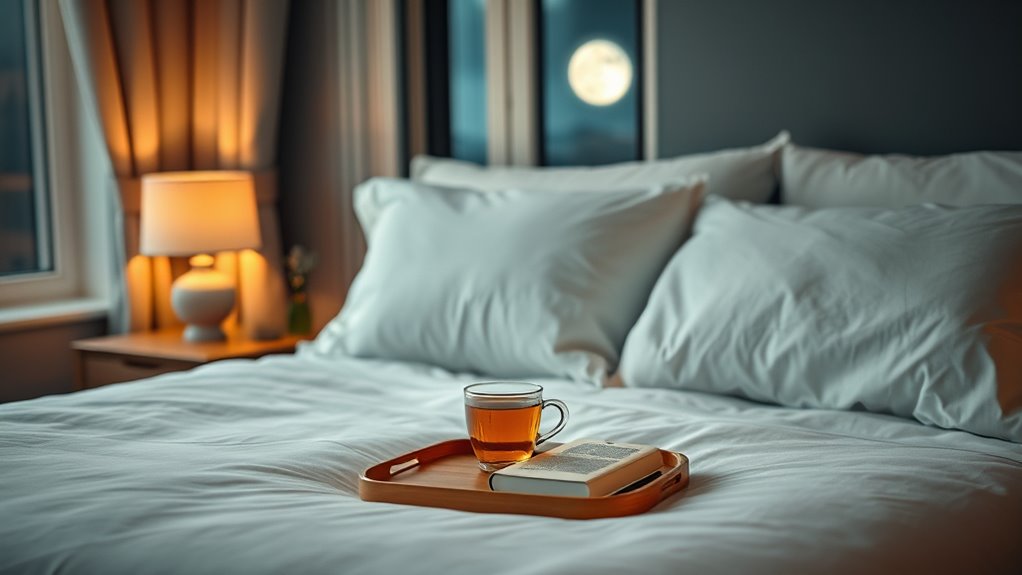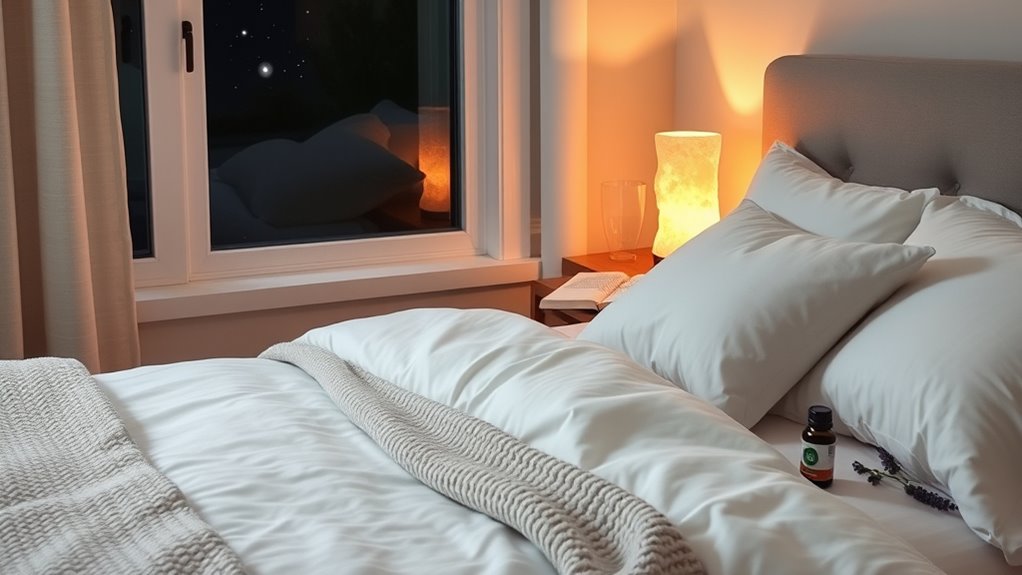To enjoy restful nights, create a peaceful sleep environment by keeping your room cool, dark, and quiet. Remove bright lights and electronics that can interfere with your sleep cues. Use blackout curtains or a sleep mask to block out light, and consider soothing scents like lavender to promote relaxation. Consistent habits in a calming space help your body recognize it’s time to rest, setting the stage for more restorative sleep and vivid dreams—keep exploring for more tips.
Key Takeaways
- Create a cool, dark, and quiet sleep environment using blackout curtains and noise machines to promote deeper rest.
- Avoid bright lights and electronic screens before bed to support natural circadian rhythms.
- Establish a consistent sleep schedule to condition your body for restful nights and vivid dreams.
- Incorporate calming scents like lavender to relax the mind and enhance sleep quality.
- Minimize disruptions by removing distractions, ensuring a peaceful space that fosters better sleep and dream recall.

Have you ever wondered why some nights you fall asleep easily while others leave you tossing and turning? The truth is, your sleep environment plays a vital role in how quickly and deeply you drift off. Creating a peaceful, inviting sleep space isn’t just about comfort; it’s about setting the stage for dream enhancement and restorative sleep. When your bedroom is cool, dark, and quiet, your body signals that it’s time to relax, making it easier to shift into sleep. Remove distractions like bright lights or noisy electronics, and opt for blackout curtains or a sleep mask to block out light. These small adjustments help your brain recognize that it’s time to rest, promoting better quality sleep.
Your sleep environment also impacts your ability to remember and enjoy your dreams. When your surroundings are calming and free of interruptions, your mind can enter the deeper stages of sleep, where vivid dreaming occurs. Conversely, a disruptive environment can fragment your sleep cycle, diminishing your ability to experience the full spectrum of dreams. To foster dream enhancement, consider adding soothing elements like gentle white noise or calming scents such as lavender, which can help relax your mind even further. Consistently maintaining a sleep-friendly environment trains your brain to associate your bedroom with rest, increasing the likelihood of more vivid, memorable dreams. Ensuring your sleep environment is free of disruptions also helps optimize your sleep hygiene, supporting overall sleep quality and dream recall.
Frequently Asked Questions
Can Sleep Hygiene Practices Help With Chronic Insomnia?
Yes, improving sleep hygiene practices can help with chronic insomnia. You should establish consistent sleep routines, like going to bed and waking up at the same time every day, to regulate your internal clock. Additionally, optimizing environmental factors—such as keeping your bedroom dark, quiet, and cool—can create a better sleep environment. These habits combined can reduce insomnia symptoms and promote more restful nights.
What Foods Promote Better Sleep Hygiene?
Think of your sleep as a delicate garden needing the right nourishment. Foods like cherries, almonds, and bananas contain sleep-promoting nutrients, while combining carbs with protein in bedtime snacks can boost serotonin levels. You might find, like many, that a small bowl of yogurt with honey helps you unwind. Incorporate these food combinations into your evening routine to enhance your sleep hygiene naturally and enjoy more restful nights.
How Does Exercise Impact Sleep Quality?
Exercise benefits your sleep quality by helping you fall asleep faster and enjoy deeper rest. Regular physical activity can reduce sleep disruption caused by stress or anxiety, promoting more consistent sleep patterns. However, intense workouts close to bedtime might interfere with your sleep, so it’s best to schedule exercise earlier in the day. Overall, staying active can markedly enhance your sleep hygiene and overall restfulness.
Are Sleep Aids Necessary for Maintaining Good Sleep Hygiene?
Around 30% of adults use over-the-counter remedies for sleep issues, but sleep aids aren’t always necessary. You can try natural sleep solutions like maintaining a consistent bedtime, avoiding screens before sleep, and creating a calming environment. These habits often improve sleep quality without depending on medication. If sleep problems persist, consult a healthcare professional, but for many, good sleep hygiene techniques can be enough to ensure restful nights.
How Does Sleep Hygiene Differ for Shift Workers?
As a shift worker, your sleep hygiene needs to adapt to combat shift work challenges and circadian disruption. You should prioritize consistent sleep schedules, even on days off, and create a dark, quiet environment to promote better rest. Avoid caffeine and screens before sleep, and consider strategic light exposure to reset your internal clock. These steps help mitigate the effects of irregular hours and improve your sleep quality.
Conclusion
By practicing good sleep hygiene, you set yourself up for restful nights and brighter days. It’s funny how small habits—like turning off screens or sticking to a schedule—can make such a big difference. Sometimes, the simplest routines lead to the best sleep, almost as if the universe conspired in your favor. So, keep these habits in mind, and you might just find that peaceful, rejuvenating sleep was waiting for you all along.









